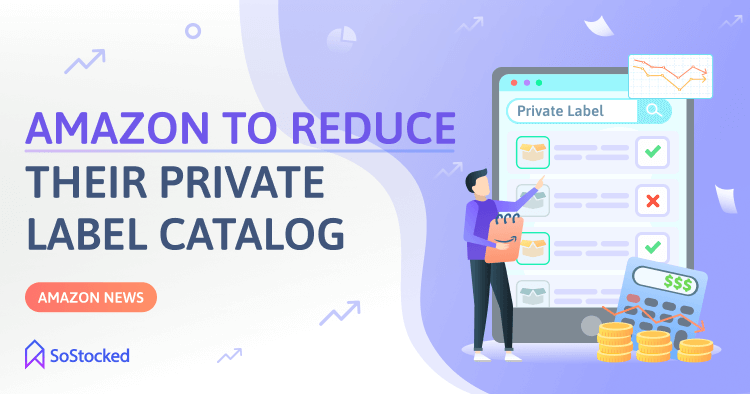
Amazon Reduces Their Private Label Catalog Amid Mounting Regulatory Pressure
Amazon is reportedly reducing the number of items and categories under its private label (PL) business by more than half due to poor sales, and as we assume, the impending antitrust bill. 🤔
Inflation Takes its Toll on Amazon and Consumers
The decision to scale back Amazon’s PL selection came after a profitability review by Dave Clark, former head of Consumer Business for Amazon. While the PL segment offers a wide range of products to customers at affordable prices, it only accounts for 1% of the company’s total retail sales, a stark contrast to the 10% target set by former CEO, Jeff Bezos, a few years ago.
Clark also wanted the PL team to focus on better-selling essential items instead of products that didn’t meet the profit threshold. And this proved to be a good strategy, as Prime Day 2022 customers kept much of their purchases to basic goods, such as household items, health and beauty, and consumer electronics.
⚠️ In fact, Numerator found that 5% of Prime Day products sold for over $100, while 58% sold for below $20. Additionally, a little over a third of customers waited for Prime Day specifically to buy a certain product at a much lower price, while 28% passed on a great deal because it wasn’t essential, indicating that people would rather prioritize their needs than wants, a shopping behavior that may continue through to Q4.
Amazon’s reported $3.8 billion net loss in the first quarter of 2022 (their first loss since 2015) may have also been one of the deciding factors. Amazon CEO, Andy Jassy, has attributed part of the company’s shortfall to reduced online consumer spending, Rivian’s shrinking valuation, and added costs in the form of excess fulfillment and transportation capacity.
Increasing Pressure from Antitrust Regulators
According to Wall Street Journal (WSJ), the eComm giant may also exit the private label business altogether to address regulatory pressure and possibly to avoid potential hefty fines ahead of the impending US antitrust bill targeting Big Tech.
Although Amazon has denied this in a statement to WSJ, it’s not beyond the realm of possibility for them to close their PL business or at least make a concession (e.g., end data grabbing), considering they recently offered to stop anti-competitive practices in Europe in an attempt to halt two investigations.
In the US, Amazon’s private label business has been under scrutiny from lawmakers (and third-party sellers) since its launch in 2009.
Amazon has flooded the marketplace with 243,000 products across 45 different PL brands, allowing them to directly compete and even prioritize their own offerings over third-party sellers’ by manipulating the search algorithms to drive customers toward AmazonBasics and other in-house brands.
In one of its investigative reports, WSJ also revealed that some PL employees spied on sellers and collected their sensitive data to develop their own brands that resembled original items, thereby undercutting sellers on Amazon.
Under the proposed antitrust law, S.2992, these practices would be considered anti-competitive, and therefore subject to injunctions and penalties.
As sellers, perhaps we could take Amazon’s move to reassess their PL business to reduce regulatory pressure as a win and a step toward leveling the playing field. 💪
Related: Why Amazon Wants You To Lobby Congress: What is S.2992?
Need more information?
- Send Message: We typically reply within 2 hours during office hours.
- Schedule Demo: Dive deeper into the nuances of our software with Chelsea.
- Join Live Upcoming Webinar: New to Amazon inventory management? Learn three inventory techniques you can implement right away.
 Start Your Free Audit
Start Your Free Audit